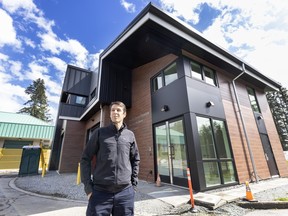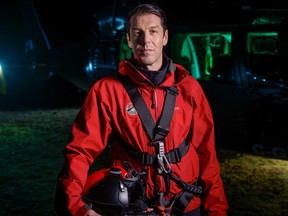Recently appointed fire chief in District of North Vancouver and father of three will still be one of the search-and-rescue volunteers

Article content
As the final minutes of Mike Danks’ 10-year tenure as leader of North Shore Rescue wound down on June 4, he was still keeping an eye on two cellphones he had placed on the table before him.
He was concerned about three experienced mountaineers who had gone missing in Garibaldi Park on May 31 and was hoping for news from Squamish Search and Rescue.
Danks will still be involved with NSR in the field, but as the new fire chief in the District of North Vancouver and a father of three, the 48-year-old felt it was time to step back and let someone else run things.
Advertisement 2
Article content
Sitting inside the new Arnold Wallner SAR base station next to the Cleveland Dam, Danks reflected on his decade of North Shore Rescue leadership.
“Personally, it’s been such a privilege to be in that position, and a privilege to go on so many journeys with members of the team and with the people who we’ve rescued,” he said after showing a guest around the new facility, not yet operational because it sits in the middle of a construction site while the dam gets upgraded.
“But I also think it’s really critical to talk about and highlight the impact these calls can have on the people who are responding to them.”
The missing Garibaldi climbers were a case in point.
“We’ve been working with Squamish, trying to help them, but the impact this has had on the SAR community is far-reaching,” Danks said.
“Everyone puts themselves in those missing people’s shoes, trying to understand how they got in that situation. And now everyone is trying to solve that problem, to get in there, to do it safely, and to bring them home to their families to provide closure.”
You maybe need to be a first responder or a war combatant to fully grasp the vicarious trauma these volunteers face.
Advertisement 3
Article content
“I’ve seen the impact it’s had on other team members, people who are highly experienced physicians, and they go through it as well,” Danks said. “It’s the exposure, what you see wears on you.”
Mental health
The new SAR base replaces a couple of shipping containers and a Porta Potty, thanks to a $1-million donation from Wallner, a West Vancouver businessman.
Danks is particularly fond of a small wooden carving of an alpine climber that hangs from a rope on the second floor. It was gifted by NSR’s Bavarian-sister SAR team Bergwacht Oberau, which is from Wallner’s hometown.
The new base has a large heated room to store sensitive medical equipment and a place to change into rescue gear rather than standing outside in the rain. A large control room sits next to a conference room, and there is a kitchen, bathroom and laundry.
“Now, when you come back from a call covered in blood, you can shower and reset yourself a little bit,” Danks said.
The public mostly hears about the successes NSR has, not about the families who fly to Vancouver to confront rescue workers about why their loved one wasn’t saved, or about the crushed and broken bodies, or the suicides — 17 to 30 years old, for the most part — that SAR volunteers need to retrieve.
Article content
Advertisement 4
Article content
Something that has helped a lot of rescuers, including Danks, is a program called First Responders Resiliency, a four-day peer-based support program at Loon Lake Lodge in Maple Ridge.
It was set up in 2017 by two UBC professors of medicine, Dr. Duncan Shields and Dr. David Kuhl, after back-to-back suicides of two Surrey firefighters.
Forty-four per cent of first responders meet the criteria for common mental health disorders, Shields said, four times the Canadian average.
First responders are chosen for their strength and their stoicism, not normally the type of person to take a knee, he said.
“When I met Mike, what really struck me was the disconnect between his smile and his eyes. He smiled and yet his eyes were sad. His eyes told a different story about what he’d seen.
“It’s a look I know very well.”
You couldn’t meet a kinder, more generous human being than Danks, Shields said, yet there is a burden of strength in being the one with the answers, the one who’s going to make things better.
“And what I’ve seen Mike do is evolve to be able to be strong, but also know when to be vulnerable, that it’s not all about strength and stoicism.”
Advertisement 5
Article content

In his blood
Danks grew up in North Vancouver, skiing, climbing and exploring its backcountry.
His father Allan joined NSR in 1971, when it was still mostly a civil defence unit during the Cold War, and then Allan became team leader himself.
In 1976, when Danks was three months old, his dad strapped him to his back and climbed Mt. Seymour. By the time Danks was five or six, he was the go-to “subject” during team training (i.e. a pretend patient in need of rescue), being hoisted and carried by stretcher out of the deep woods.
At 19, he became a full-fledged NSR member.
He was 37 when Tim Jones, a legend in search-and-rescue circles and mentor to Danks and others, died suddenly in January of 2014, leaving a leadership void no one at the time thought could be filled.
Jones, although only 57 when he died, had already begun preparing NSR for his successor.
“Tim Jones had a group of leaders-in-training, and the one who obviously stood out in that group was Mike Danks,” said Mike Little, the mayor of the District of North Vancouver who has known Danks for years.
“He has charisma, people gravitate to him.”
Advertisement 6
Article content
On call
Rescue volunteers rarely, if ever, get a Christmas Day off. There is almost always a call.
Nothing drilled home how busy the North Shore team is than the ribbon-cutting for the Arnold Wallner base station on April 6. It was interrupted twice by rescue calls.
There are 45 active SAR volunteers with North Shore Rescue, including two physicians — and another 20 volunteers with training to help out if needed, including eight more physicians.
The organization’s annual operating budget is around $700,000, all of it raised by donation. The province pays for helicopter flight time during rescues ($7,000 an hour), but North Shore Rescue pays for flights that are part of training.
The three North Shore municipalities chip in to pay a salary to help keep things organized out of the District of North Vancouver municipal hall.
A lot of onlookers wonder why stranded and injured hikers, climbers, bikers and cliff-jumpers don’t have to pay for their rescues, or why Victoria doesn’t pay for the dozens of SAR teams throughout the province.
But as he passes the torch, Danks pondered what that future might look like.
Advertisement 7
Article content
“That’s the million-dollar question,” he said. “I think the set-up we have right now, the community support that we have, is working very, very well. It gives search and rescue teams autonomy to react rapidly.
“I think if we were tied into the provincial government, we would not be at the same level we’re operating at now. I think it would take away some of the incredibly dedicated, selfless volunteers we have. You’d lose that passion.”

Icing on cake
It was a small gesture, but later that evening at NSR’s annual general meeting in its North Vancouver headquarters on Bewicke Avenue, six dozen cupcakes and donuts greeted Danks, bringing tears to his eyes.
The spread, laid out by 11-year NSR veteran Kayla Brolly, included photos of Danks on each goodie in honour of his decade as leader, while the AGM in part was to name his successor, Scott Merriman.
“Honestly, Mike’s incredible,” said Brolly, an emergency nurse at Lions Gate Hospital.
The cupcakes she had supplied would have been layer cakes 20 feet high if that had been practical.
“They were a token to show Mike that we see you and we appreciate you deeply. I’ve had a lot of different leaders come and go throughout my life and I use Mike as a model because he’s exceptional.”
Advertisement 8
Article content

Recommended from Editorial
Bookmark our website and support our journalism: Don’t miss the news you need to know — add VancouverSun.com and TheProvince.com to your bookmarks and sign up for our newsletters here.
You can also support our journalism by becoming a digital subscriber: For just $14 a month, you can get unlimited access to The Vancouver Sun, The Province, National Post and 13 other Canadian news sites. Support us by subscribing today: The Vancouver Sun | The Province.
Article content





